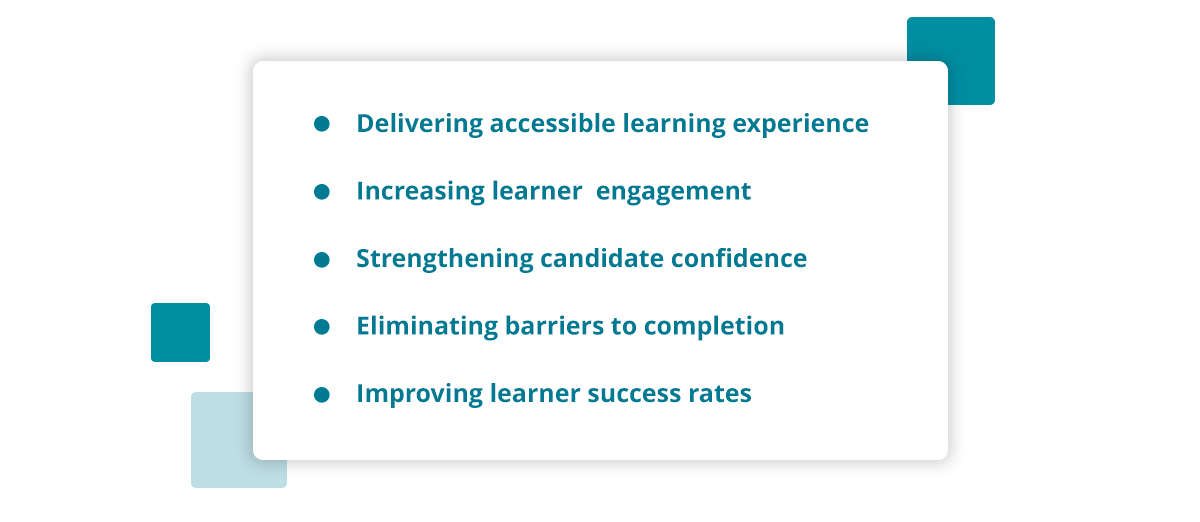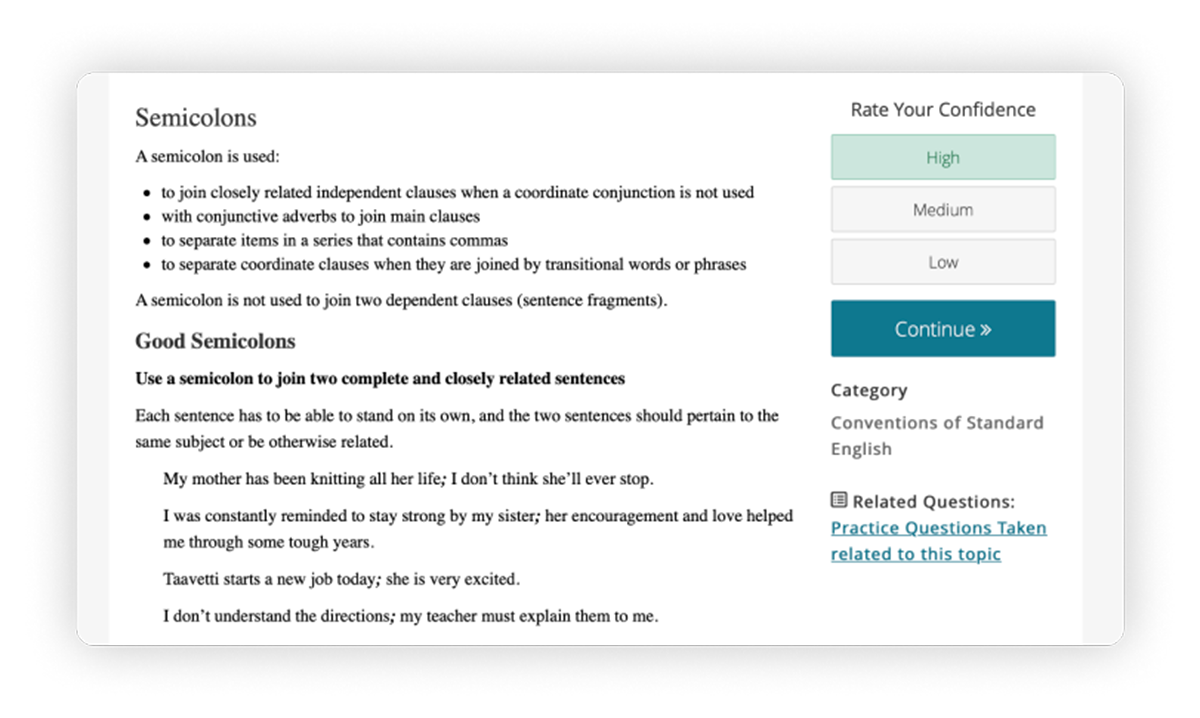Learning Personalization: How To Boost Candidate Confidence and Success
Continuing Professional Development (CPD) is essential in today's dynamic job market, where professionals must constantly adapt to new challenges, acquire new skills, and update their knowledge. In 2023, upskilling is a top priority for employers, with internal mobility recognized as vital for retention. Companies will invest in continuous learning to boost careers, close skills gaps, and strengthen succession planning, allowing them to remain competitive and attract top talent.
But modern learners need more than just opportunities–they require flexible, effective learning experiences tailored to their personal needs, learning preferences, and skill levels. Learning personalization – the practice of customizing learning experiences to the interests and capabilities of individual learners – is the key to unlocking this potential. It empowers learners to actively participate in their learning journey and make the most of their training opportunities. As such, organizations focused on professional development should adapt to this trend and actively incorporate personalized learning in their certification training programs.
To help you do so, this blog explores the concept of personalized learning and how it can be used to foster candidate confidence and success.
Importance of Learning Personalization in Certification Training
Understanding evolving candidate needs is particularly important for credentialing bodies and membership associations offering high-stakes certifications. As a certification training program provider, your goals may include:
This requires a strategic approach to learning management that emphasizes flexibility and individualization. By integrating personalized learning paths into your certification training, you can effectively address these goals, paving the way for enhanced candidate outcomes.
But how does the link between personalization and success work in practice? Here’s a closer look at the benefits of adopting such an approach.
Levels the Playing Field
Traditional instructor-centered models often assume everyone learns at the same pace, but reality shows this simply isn’t the case, highlighting the need for a personalized learner-centered approach. Personalized learning paves the way for enhanced candidate outcomes by accommodating the unique needs of each learner, leveling the playing field regardless of ability level. Faster candidates advance at their own pace, and slower candidates receive the assistance they need. Organizations that leverage personal learning paths in their certification training programs can help all learners achieve proficiency.
Improves Candidate Engagement
Personalized learning enhances engagement and skill development, fostering collaboration among candidates, managers, and L&D professionals, thus benefiting learners and organizations alike. LinkedIn's 2023 Workplace Learning Report states that personalized learning increases engagement by tailoring content to individual career paths and skill sets. When learning experiences are aligned with personal aspirations, motivation and commitment to the learning process significantly improve. Companies that adopt personalized learning strategies witness increased hours of content consumption and overall satisfaction.
Enhances Exam Performance
In the K-12 education sector, research on personalized learning has shown encouraging results. For example, a comprehensive study by RAND Corporation found that 11,000 students at 62 schools using personalized-learning approaches made more significant gains in math and reading than their peers at more traditional schools. While this study focused on formal education, the implications for professional certification training are clear. By implementing individualized learning strategies, credentialing bodies and professional associations can help candidates better prepare for exams, leading to improved success rates and stronger mastery of skills.
7 Effective Personalized Learning Strategies
To make the most of personalized learning in certification training, consider the following strategies:
- Omni-channel program delivery: Allow learners to access courses on multiple devices, offering flexibility and seamless transitions between platforms. Catering to individual preferences enhances their overall learning experience.
- Blended learning: Combine self-paced, adaptive learning with traditional instructor-led sessions. Here, you can utilize video conferencing technology for targeted instruction and ask candidates to review content on their own time. This method allows learners to benefit from one-on-one instruction while enabling instructors to tailor their courses to specific groups.
- Adaptive learning: Present only new or unmastered information, tailoring education to individual needs. This approach makes it easy to determine candidates’ progress and adjust their content accordingly, enabling repetition for better understanding and confidence in more advanced content.
- Personalized microlearning: Provide focused, bite-sized lessons that target specific knowledge gaps. Microlearning enables learners to engage with content at their own pace and convenience, promoting retention and application of the material.
- Gamification: Employ game mechanics like leaderboards, badges, and progress bars to make learning engaging, enjoyable, and competitive. By leveraging the human desire for competition and self-improvement, gamification fosters motivation and participation.
- Custom learning paths: Enable candidates to concentrate on relevant material, allocating more time to challenging topics and skipping familiar ones. This creates a tailored learning plan that caters to individual needs and goals, ensuring efficient use of time and resources.
- Reporting: Offer progress tracking and confidence assessments, allowing them to identify strengths and weaknesses in their understanding of the material. For learning program administrators, detailed reporting helps uncover insights into content performance, learner improvement over time, and opportunities for course development to better meet candidates’ needs.
Boost Candidate Confidence and Success with Personalized Study Plans
So far, we've discussed the benefits of personalized learning and custom learning programs. But how can you put these insights into practice? The following four strategies are essential components in BenchPrep's LMS and are a great starting point:
Use High-Level Data to Measure Candidate Confidence
Confidence-based learning assesses both the correctness and confidence of candidates’ answers. By using data from your LMS, you can identify misinformed and doubtful learners, revealing areas where they need targeted instruction. Implementing personalized learning plans based on this data can transform them into confident and well-informed learners. This strategy not only accelerates the learning process but also enhances overall candidate confidence leading to improved success rates.
Include Confidence-Weighted Testing to Track Learning
Confidence-weighted testing poses a two-pronged question, asking for the correct answer and the confidence level in that answer. BenchPrep’s LMS incorporates confidence testing to identify areas of misinformation, provide learners with real-time feedback, and reinforce knowledge. By implementing this approach, candidates achieve mastery while retaining information for long-term success. This personalized feedback enables learners to progress at their own pace, ensuring a more effective and efficient learning journey.
Offer Adaptive Learning Paths to Meet Individual Needs
Adaptive learning paths provide a tailored experience and can improve candidate engagement by nearly 100%. By utilizing learning activities and data-driven insights, structured learning plans and remediation help learners better understand challenging concepts. These personalized learning pathways address each candidate’s unique strengths and weaknesses, ensuring a tailored educational experience that boosts candidate confidence and success.
Incorporate Personalized Candidate Feedback for Better Retention
A versatile learning management platform that integrates individualized learner feedback can improve knowledge retention and application. Here, you should use a wide range of question styles, such as true-or-false, multiple-choice, essay prompts, and interactive drag-and-drop questions to engage candidates and encourage critical thinking. This active learning feedback loop rewards learners for correct answers and motivates them to seek solutions when they get them wrong. By offering customized feedback and resources for weaker subjects, your LMS will foster better retention and enhance candidate success.
Now that you have mastered the concept of personalized learning, let's dive into the second stage of a candidate's journey toward certification: practice. Learn how it can help candidates feel more confident for their exams while improving retention and knowledge recall.






